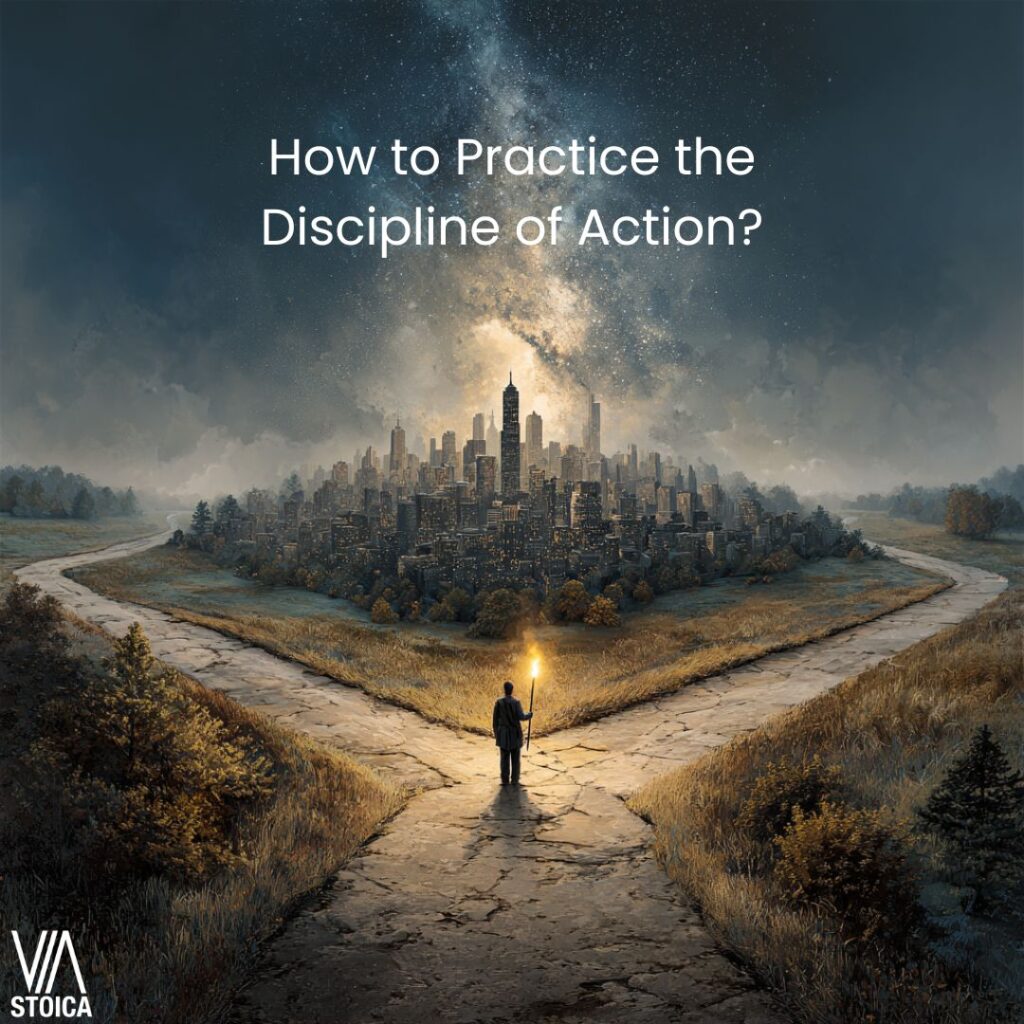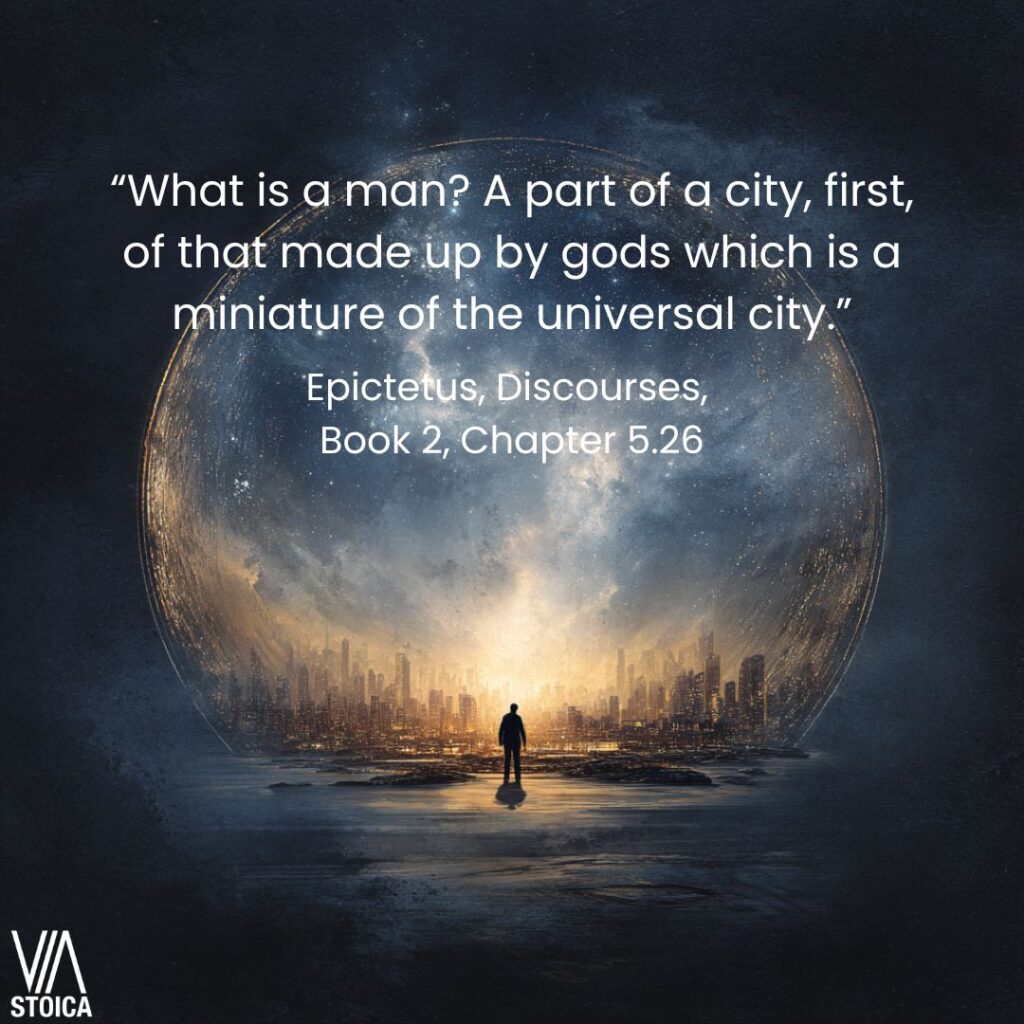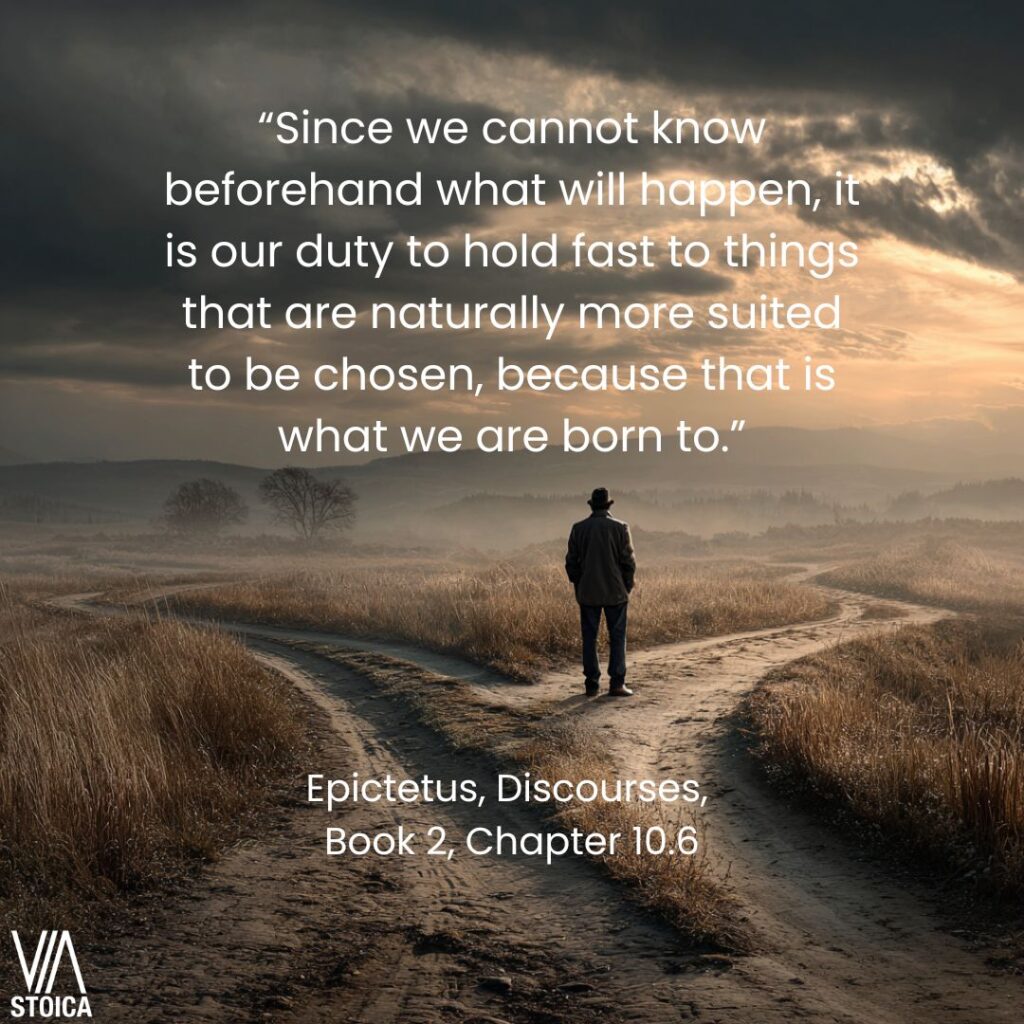How to Practice the Stoic Discipline of Action
Introduction: Living in Accord with Human Nature

The Stoic discipline of action (Greek: hormē, Latin: actio) is about how we live in relation to others and the world. While the discipline of desire governs how we orient ourselves toward what is and is not under our control, and the discipline of assent concerns how we judge impressions, the discipline of action turns outward: it is about what we do.
Pierre Hadot summarizes it clearly:
“’Justice’ corresponds to the discipline of action, which makes us act in the service of the human community.”
Pierre Hadot, The Inner Citadel, Chapter 7, p. 201
Marcus Aurelius reminds himself:
“What I do? I attribute it to human beneficence. What is done to me? I accept it – and attribute it to the gods, and that source from which all things together flow.”
Marcus Aurelius, Meditations, Book 8.23
The discipline of action calls us to live with justice, seriousness, and contribution. It is about connecting personal virtue with communal life, so that what we do each day reflects the best of our human capacity.
Philosophical Grounding: Action, Justice, and Appropriate Acts
Justice and Human Community
Hadot explains that justice, for Stoics, is not only legal fairness but living as a rational being among others:
“Justice corresponds to the discipline of action, which makes us act in the service of the human community.”
Pierre Hadot, The Inner Citadel, Chapter 7, p. 201
Marcus reflects on this in his daily practice of writing:
“He has dedicated himself to serving justice in all he does, and nature in all that happens.”
Marcus Aurelius, Meditations, Book 10.11a
In Stoicism, therefore, action and justice are intertwined. One cannot live well without acting for the good of others, nor can one act justly without aligning with universal Nature. Beyond that, Marcus Aurelius shows the difference between our actions, based on justice and our attitude toward Nature’s actions, based on acceptance.
Seriousness vs. Frivolity
When we act, we need to pay attention to the world around us and to our own souls. It is our duty to use our rational minds to figure out what the best course of action is. We cannot take this lightly, as Hadot warns:
“The vice which is opposed to the discipline of action is thus frivolity (eikaiotes). It is the opposite to that seriousness or gravity with which all human actions should be accomplished. This human frivolity or lack of reflection does not know how to submit to the discipline of action; it is the agitation of a jumping jack, a puppet, or a top.”
Pierre Hadot, The Inner Citadel, Chapter 8, p. 273
Marcus cautions against letting the rational mind be degraded:

“Stop allowing your mind to be a slave, to be jerked about by selfish impulses, to kick against fate and the present, and to mistrust the future.”
Marcus Aurelius, Meditations, Book 2.2
The discipline of action calls for seriousness, not in the sense of grimness, but in giving our whole heart to what is before us:
“In applying one’s whole soul to doing right and speaking the truth. There remains only the enjoyment of living a linked succession of good deeds, with not the slightest gap between them.”
Marcus Aurelius, Meditations, Book 12.29
Doing Less, Doing What Matters
How do we know what to do and what not to do? When we think about what we are required to do, many can go overboard and overextend or do too much. When we look at the role we play in a situation, that can help us determine what our responsibilities are, and when we know this, a lot of the time we don’t have to do as much as we thought we had to.
Marcus, quoting Democritus, wrote:
“‘If you seek tranquility, do less.’ Or (more accurately) do what’s essential – what the logos of a social being requires, and in the requisite way. Which brings a double satisfaction: to do less, better.”
Marcus Aurelius, Meditations, Book 4.24
This simplicity is the essence of Stoic action: not scattered busyness, but focused deeds that reflect reason and community. To focus on your task in the role that is assigned to you in each situation and to do that well.
Appropriate Actions (Kathekonta)
The Stoics distinguished between perfect moral actions (katorthōmata), which only the sage performs, and “appropriate actions” (kathekonta), which everyone can practice.
Hadot explains:
“What the Stoics mean by ‘appropriate actions’—appropriate, that is, to Nature—and ‘duties’ (kathekonta). They are actions, hence something which depends upon us; and they presuppose an intention, either good or evil.”
Pierre Hadot, The Inner Citadel, Chapter 8, p. 278
Our duties arise from our natural instincts: to preserve ourselves, to care for our children, to live socially, and to act rationally. With the advent of reason, instinct becomes reflective choice:
“With the appearance of reason in human beings, natural instinct becomes reflective choice. At this stage, we recognize rationally which things have ‘value’, since they correspond to the innate tendencies which nature has placed within us.”
Pierre Hadot, The Inner Citadel, Chapter 8, p. 277
Thus, appropriate actions are those that fit our role, time, and place in harmony with Nature.
Role Ethics: Living According to Our Duties
Epictetus emphasized that we are never just abstract individuals but always occupy roles, as children, siblings, friends, parents, citizens, or leaders. Each role comes with appropriate actions attached to it:
“If you are on the council of any city, you should remember that you are a councillor; if a youth, a youth; if an old man, an old man. For each of these names, if rightly considered, always points to the acts appropriate to it.”
Epictetus, Discourses, Book 2, Chapter 10.10–11
This role ethics means the discipline of action is always contextual: justice is not something we perform in the abstract, but in the small, concrete duties of daily life, listening attentively to a friend, fulfilling a promise, or contributing to civic life.
Oikeiōsis: Expanding Circles of Concern
The Stoics explained the foundation of action through the concept of oikeiōsis (appropriation, or familiarization). At birth, we are naturally concerned with self-preservation. As reason develops, this concern expands outward: first to family, then to our wider community, and finally to all humankind.
Hadot notes:
“The Stoics take as their starting-point a fundamental animal instinct, which expresses the will of Nature. By virtue of a natural impulse which impels animals to love themselves and to accord preference to themselves, they tend to preserve themselves and to reject whatever threatens their integrity. It is in this way that what is ‘appropriate’ to nature is revealed to natural instinct.”
Pierre Hadot, The Inner Citadel, Chapter 8, p. 277

Epictetus frames this cosmopolitan view clearly:
“What is a man? A part of a city, first, of that made up by gods which is a miniature of the universal city.”
Epictetus, Discourses, Book 2, Chapter 5.26
In humans, reason universalizes instinct, revealing our kinship with all rational beings. To live according to the discipline of action is to recognize this widening circle of concern and to act justly not only for our private circle but for the larger community of humankind.
Moral Choice (Prohairesis): The Center of Our Freedom
For Epictetus, all Stoic practice comes down to the proper use of prohairesis, our faculty of moral choice. This is the part of us that can never be enslaved, because it governs what is truly “up to us”: our judgments, impulses, and actions.
“The essence of the good is a certain disposition of our (moral) choice, and essence of evil likewise.”
Epictetus, Discourses, Book 1, Chapter 29.1
While fortune may strip away possessions, health, or reputation, no one can force us to act against reason unless we give our assent. Thus, the discipline of action is not about external results but about ensuring that every choice springs from reason aligned with nature.
“It is not the things themselves that disturb people but their judgements about those things.”
Epictetus, Handbook, 5
Our judgments are the work of prohairesis. To practice the discipline of action is therefore to cultivate a vigilant awareness of what we choose in each moment.
This makes Stoic ethics profoundly empowering: whatever role we find ourselves in, parent, citizen, friend, we always retain the freedom to choose to act justly. Our roles may be given by fate, but how we play them belongs entirely to us.
The Reserve Clause and the Limits of Knowledge
The Stoics insisted that we act with commitment, but without attachment to results, always keeping the “reserve clause” (hypexairesis): if nothing prevents me.
Seneca illustrates this with his probabilistic framing:
“We never wait for absolute certainty, since discovery of the truth is arduous, but we follow what is likely to be true. This is the path we follow in accomplishing all our tasks… We follow where reason, not truth, has taken us.”
Seneca, On Benefits, Book 4, Chapter 33.2
Epictetus emphasizes a similar approach:
“Since we cannot know beforehand what will happen, it is our duty to hold fast to things that are naturally more suited to be chosen, because that is what we are born to.”
Epictetus, Discourses, Book 2, Chapter 10.6

For everyone short of the sage, action involves uncertainty. As Hadot writes:
“Most people, including philosophers, who, in their own view, are precisely not sages, must painfully orient themselves within the uncertainty of everyday life, making choices which seem to be justified reasonably—in other words, probabilistically.”
Pierre Hadot, The Inner Citadel, Chapter 8, p. 281
The discipline of action teaches us to act sincerely and reasonably, but without attachment to outcomes.
Application and Relevance Today
The discipline of action offers a powerful antidote to modern life. In an age of distraction and busyness, Stoicism invites us to act with clarity, justice, and purpose.
- Against Distraction: Instead of scattering our energy, the discipline of action helps us focus on what truly matters. “Do less, but do it well” remains timely advice.
- Against Anxiety: By adopting the reserve clause, we free ourselves from being crushed by outcomes. We act wholeheartedly but accept that results are not in our control.
- Against Isolation: In a fragmented world, justice reminds us that we are part of a larger whole. Serving others and contributing to the community give meaning to our days.
- Through Role Ethics: We can better navigate modern pressures by reflecting on our roles, parent, colleague, friend, citizen, and what duties follow from each.
- Through Oikeiōsis: We resist self-absorption by expanding our circle of concern, recognizing that our well-being is tied to the well-being of others and of the larger world.
- Through Moral Choice: By exercising prohairesis, we claim the freedom to live with integrity, whatever our external circumstances.
Far from being a relic of ancient ethics, the Stoic discipline of action speaks directly to our struggles with overcommitment, purposeless work, and disconnection.
Practical Exercises
1. Define the Purpose of Your Action
Before beginning any task, pause and ask: Am I really carrying out an action? Relate it to the good of humankind, as Marcus suggests. If it does not serve justice, community, or reason, consider whether it is worth doing at all.
Practice: At the start of your day, write down your three main actions. For each, note how it connects to justice or service.
2. Act with the Reserve Clause
When you commit to something, remind yourself: fate permitting. Do the best within your power, but keep in mind that outcomes are not guaranteed.
Practice: Before sending an email, giving a presentation, or setting a goal, say quietly: I will do this, if nothing prevents me. Notice how this relieves pressure and focuses you on effort, not results.
3. Exercise Moral Choice (Prohairesis)
In moments of stress or temptation, remember that your freedom lies in your judgments and choices, not in external events.
Practice: When disturbed, pause and ask: Is it the thing itself upsetting me, or my judgment about it? Choose to respond with reason rather than impulse.
Final Reflection
The Stoic discipline of action reminds us that life is not about doing more but about acting justly, sincerely, and in harmony with Nature. By focusing on appropriate actions, embracing the reserve clause, and exercising moral choice, we live not as scattered individuals but as citizens of the cosmos. And as a result, we can experience the good emotion (eupatheia) of joy (chara).
As Marcus Aurelius wrote:
“In applying one’s whole soul to doing right and speaking the truth. There remains only the enjoyment of living a linked succession of good deeds, with not the slightest gap between them.”
Marcus Aurelius, Meditations, Book 12.29
To live with seriousness and justice is to live well. The discipline of action shows us that every deed can be an expression of virtue, every day a step toward human flourishing.
Let’s get to work
Book a free consultation with one of our Stoic Coaches to get support. Or read more on how to practice Stoicism. Listen to the Via Stoica Podcast on Spotify, Apple Podcasts, or YouTube.
FAQ
Q1: What is the Stoic discipline of action?
It is the practice of aligning our actions with reason, justice, and the service of the human community, while accepting outcomes with the reserve clause.
Q2: How is it different from the other Stoic disciplines?
While the discipline of desire governs what we pursue and avoid, and the discipline of assent governs our judgments, the discipline of action governs what we do in relation to others and the world.
Q3: What are “appropriate actions” (kathekonta)?
These are actions suitable to our nature and role, rational, social, and moral deeds that any person can perform, not just the sage.
Q4: How can I apply the reserve clause in daily life?
Remind yourself before acting: I will do this, fate permitting. This keeps you committed yet detached from uncontrollable outcomes.Q5: Why is moral choice (prohairesis) so central?
Because it is the one faculty truly “up to us.” External events are beyond control, but we always retain the freedom to judge and choose rightly.
Want to explore more Stoic Practice?
Book a free consultation with one of our Stoic Coaches to get support. Or read more about How to Practice Stoicism here. Listen to the Via Stoica Podcast on Spotify, Apple Podcasts, or YouTube.
Author Bio
Benny Voncken is the co-founder of Via Stoica, where he helps people apply Stoic philosophy to modern life. He is a Stoic coach, writer, and podcast host of The Via Stoica Podcast. With almost a decade of teaching experience and daily Stoic practice, Benny creates resources, workshops, and reflections that make ancient wisdom practical today.
Related Posts
-
 Inner Life Terms
Inner Life TermsWhat Are Values? Principles That Guide Action and Display Nature
What are Values? Most people don’t wake up thinking about their values. They notice them indirectly, when something feels slightly misaligned. When a choice looks right on paper but leaves a faint sense of resistance. When success arrives, yet doesn’t land the way it was expected to. Values are often mistaken for opinions, preferences, or […]
Read more -
 Via Stoica Podcast
Via Stoica PodcastA Stoic Conversation with Jason Nelson: Six Seeds for a Happier Life
What if happiness is not something you achieve one day, but something you practice every day? In A Balm for Your Soul: Six Seeds for Happiness, Jason Nelson offers a grounded and humane answer to a question many people quietly struggle with: Why does life still feel off, even when things look good on paper?Rather […]
Read more -
 Greek Stoic Philosophy Terms
Greek Stoic Philosophy TermsWhat Is Philanthropia? How Stoicism Views Love for Humankind
What Is Philanthropia? Philanthropia in Stoicism is the cultivated disposition to care for human beings simply because they are human. It describes a rational, practiced goodwill toward others that flows from understanding our shared nature, rather than from emotion, obligation, or reward. This concept matters today because modern life often treats kindness as optional, sentimental, […]
Read more


Comments 0